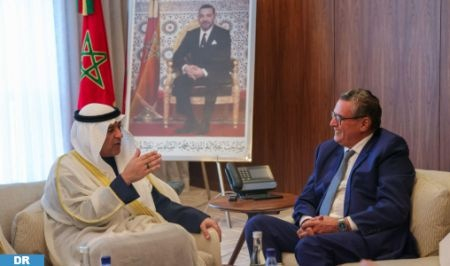Morocco and the Gulf Cooperation Council are standing shoulder-to- shoulder against common challenges. Ways of strengthening further their strategic partnership were at the center of talks held Thursday in Rabat between Moroccan foreign minister Nasser Bourita and Secretary General of GCC Jassim Mohammed Al Budaiwi.
They discussed latest developments in the Middle-East, bilateral relations, the upcoming Moroccan-Saudi business forum, and several other issues of common interests.
Morocco and the six member countries of GCC (Bahrain, Kuwait, Oman, Qatar, Saudi Arabia and United Arab Emirates) have reiterated steadfast support for the legitimate rights of the Palestinian people to establish their independent State, with East Al-Quds as its capital, on the June 1967 borders.
During their joint briefing, Bourita said King Mohammed VI commends Gulf States unwavering support for Moroccan Sahara, the Kingdom’s security, stability and territorial integrity.
He also reiterated Morocco’s firm standing with the member countries of the Gulf regional bloc in preserving their sovereignty and territorial integrity, and in taking all appropriate measures to defend their security and stability.
On Friday, the GCC chief conferred with Head of Govt. Aziz Akhannouch on cooperation prospects in renewable energies, the automotive industry, digital economy, infrastructure and tourism.
They also talked about the upcoming Gulf-Morocco business Forum and the participation of Gulf sovereign wealth funds in Moroccan projects, stressing the need to step up trading and meetings between Gulf and Moroccan investors.
Al Budaiwi was received the same day by 1st-Vice-Speaker of the House of Councilors Abdelkader Salama. Talks focused on the strategic partnership existing between Morocco and the GCC in all areas, the steadfast support of the brotherly Gulf States of the Moroccanness of the Sahara and Morocco’s commitment to defend the security and stability of Arab Gulf countries against regional challenges and threats.



